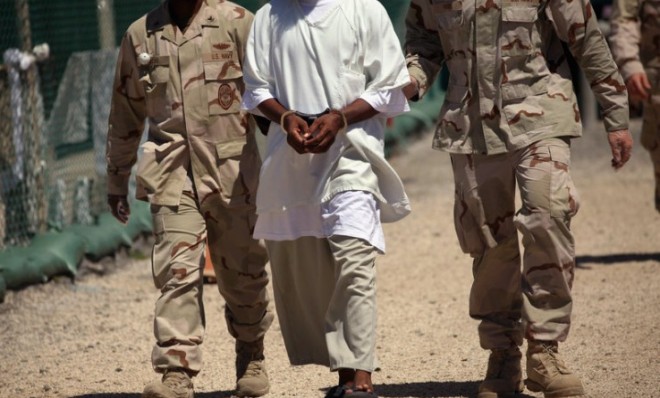Can Obama still close Guantanamo?
The U.S. has 104 prisons that can hold the remaining Gitmo detainees if Congress allows it


A free daily email with the biggest news stories of the day – and the best features from TheWeek.com
You are now subscribed
Your newsletter sign-up was successful
As President Obama prepares to start his second term, his first-term "pledge to close Guantanamo Bay looks deader than Osama bin Laden, thanks to a buzzsaw of bipartisan congressional opposition for the past four years," says Spencer Ackerman at Wired. On his second full day in office, Obama signed an executive order that, among other things, sought to close the U.S. military prison in Cuba and send the remaining detainees to countries or move them into the regular U.S. judicial system. Congress said no, blocking funding to modify U.S. prisons, banning the president from transferring any detainees to U.S. soil, and making it difficult to repatriate them abroad. The Senate renewed those restrictions in the current Defense Department funding bill, despite a veto threat, voting 54-41 on Thursday to re-up the ban on transferring Gitmo detainees stateside.
The reasons for opposing Obama's push to shutter Guantanamo take "a variety of forms, but the thread that unites them is: Not in my backyard," says Wired's Ackerman. As Sen. Lindsey Graham (R-S.C.) argued on the Senate floor Thursday, "The American people don't want to close Guantanamo Bay, which is an isolated, military-controlled facility, to bring these crazy bastards that want to kill us all to the United States." Most Americans, he added, believe the detainees "are bent on our destruction," not "some kind of burglar or bank robber."
Not everyone in the Senate agrees. Sen. Rand Paul (R-Ky.) argued Thursday that even "crazy bastards" have the constitutional right to a trial by jury (though he voted in favor of the detainee transfer ban). The chamber's strongest proponent of closing Guantanamo, though, is Senate Intelligence Committee Chairwoman Dianne Feinstein (D-Calif.). Tackling the more tangible concerns about escaped jihadists running amok in suburban Cleveland, Feinstein asked the Government Accountability Office to examine whether any U.S. detention facilities could safely hold Guantanamo prisoners. The answer, which she released Nov. 28, was yes: Six military brigs and 98 federal prisons can do so. The GAO report, Feinstein says, "demonstrates that if the political will exists, we could finally close Guantanamo without imperiling our national security."
The Week
Escape your echo chamber. Get the facts behind the news, plus analysis from multiple perspectives.

Sign up for The Week's Free Newsletters
From our morning news briefing to a weekly Good News Newsletter, get the best of The Week delivered directly to your inbox.
From our morning news briefing to a weekly Good News Newsletter, get the best of The Week delivered directly to your inbox.
By denying jihadists a powerful recruiting tool, it would actually make us safer, says The New York Times in an editorial. And that's not even getting into the abhorrent "stain on American justice" of jailing 166 men — most of whom haven't been charged with any crime — indefinitely without trial. "The issue of closing Guantanamo scarcely came up in the 2012 campaign," but thankfully Obama did "recommit to his promise near the end of the race."
Mr. Obama did not say how he intended to move the issue forward in his second term or break the congressional logjam.... If Mr. Obama is serious about fulfilling his pledge — and we trust he is — he needs to become more engaged this time around and be willing to spend political capital. Republicans, and some Democrats, who have helped to prevent the closing of the Guantanamo prison are implacable, and dedicated to a propagandistic argument that military justice for terrorists is somehow tougher and more reliable than civilian justice. The opposite is true, but the administration has made the case poorly.
From all appearances, "the Obama administration doesn't 'want to spend the political capital'" to finish the job, Benjamin Wittes of the Brookings Institute tells Wired. And "political will" isn't the only thing lacking, says Wired's Ackerman. Another is money. The GAO says that the 104 U.S. lockups that can safely hold Guantanamo detainees — and they could, as they do the 373 convicted terrorists jailed in them already — still need pretty serious modifications before any transfer takes place. So unless Congress comes around, or Obama forces it to, "Guantanamo will stay open, GAO study or no study."
A free daily email with the biggest news stories of the day – and the best features from TheWeek.com
Peter has worked as a news and culture writer and editor at The Week since the site's launch in 2008. He covers politics, world affairs, religion and cultural currents. His journalism career began as a copy editor at a financial newswire and has included editorial positions at The New York Times Magazine, Facts on File, and Oregon State University.
